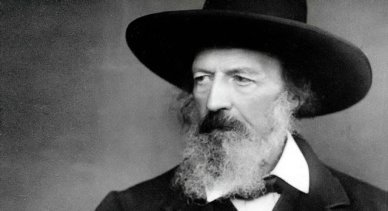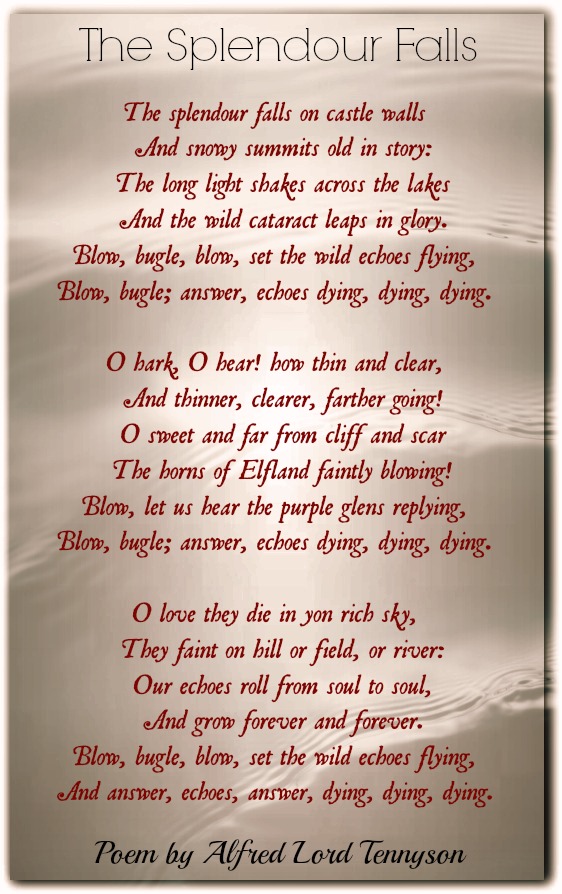
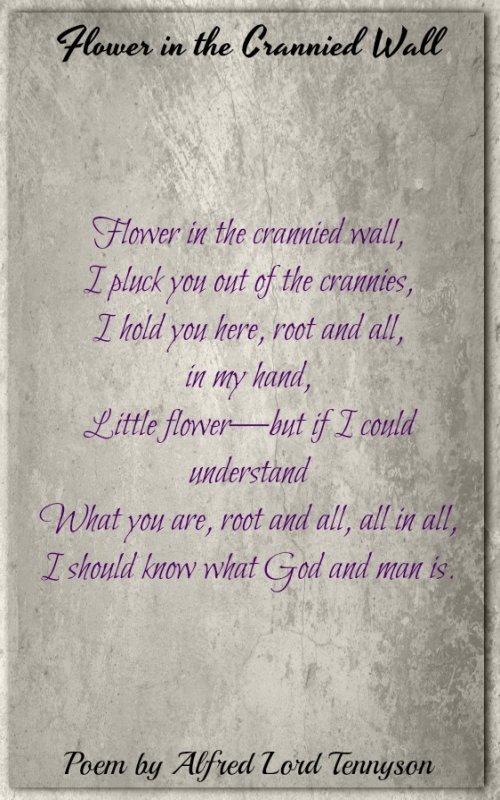
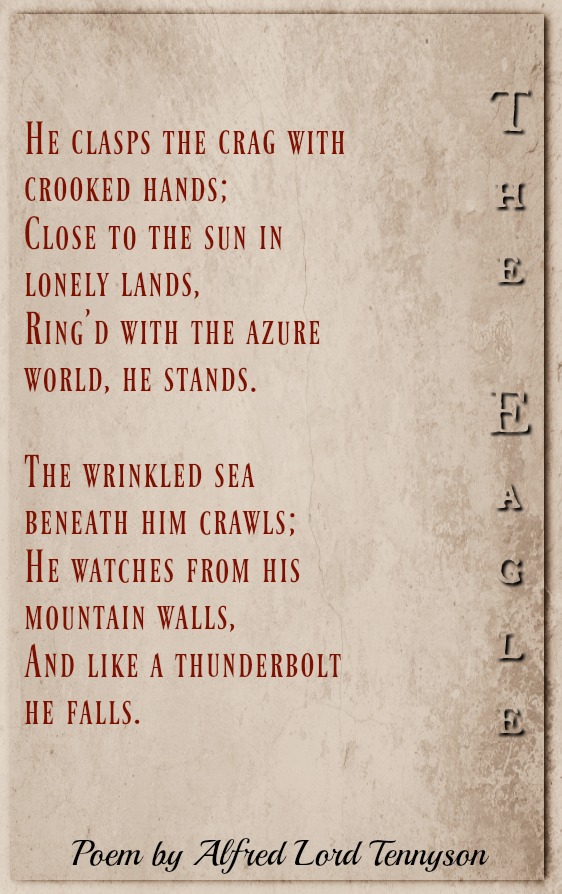
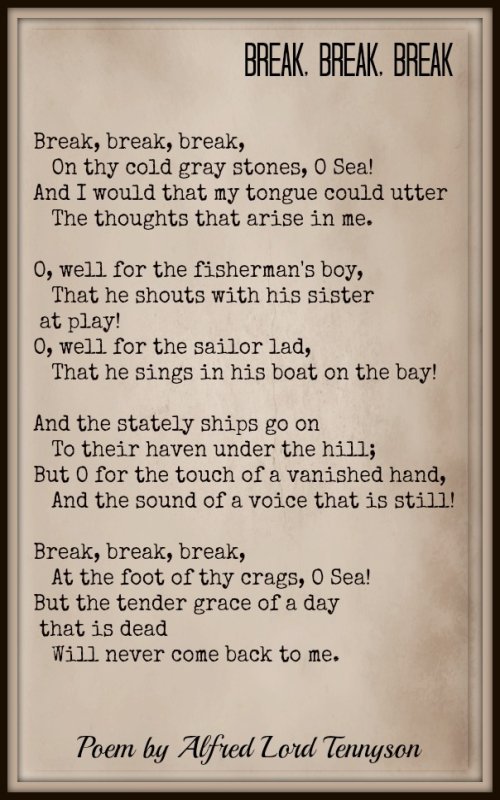
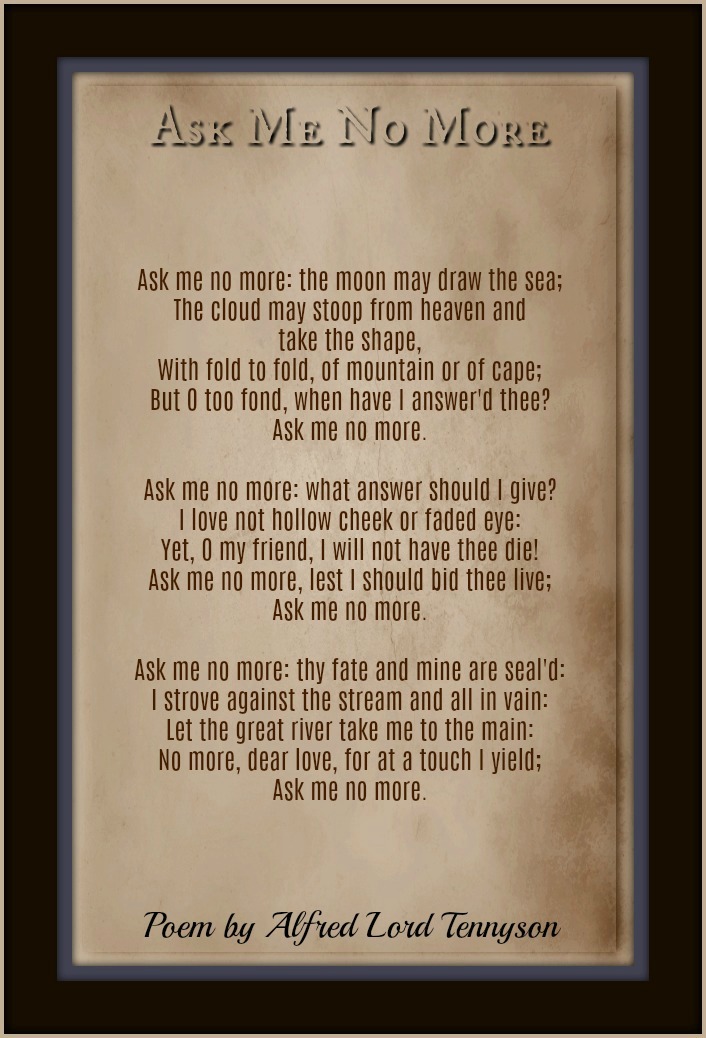
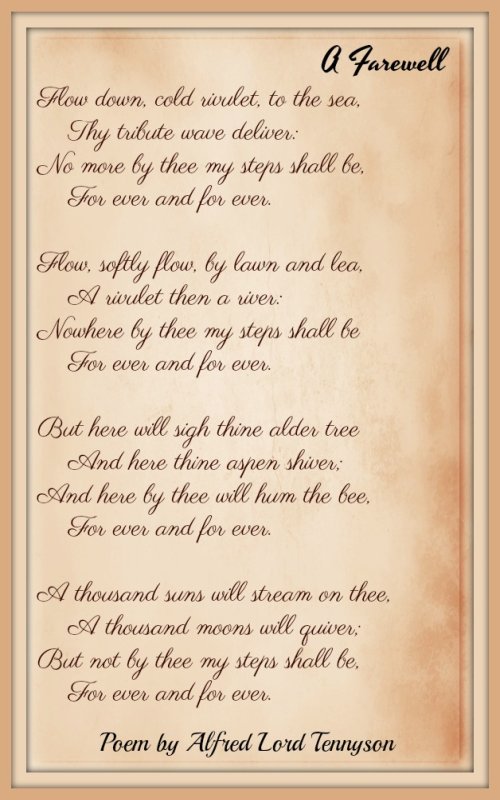
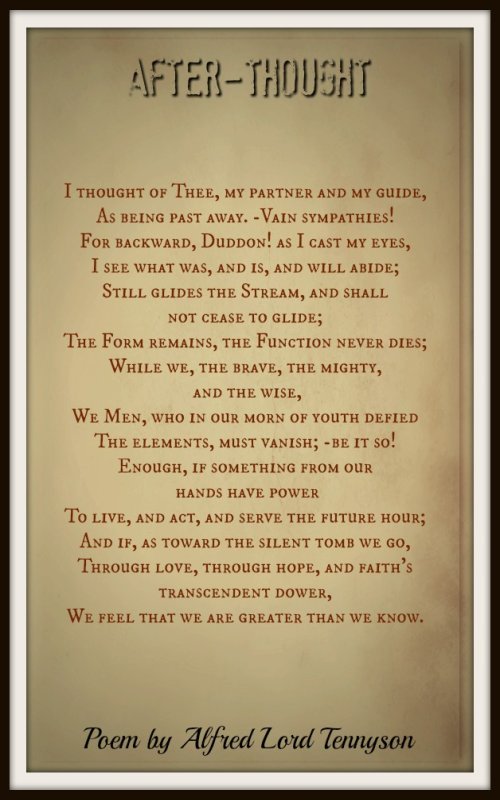
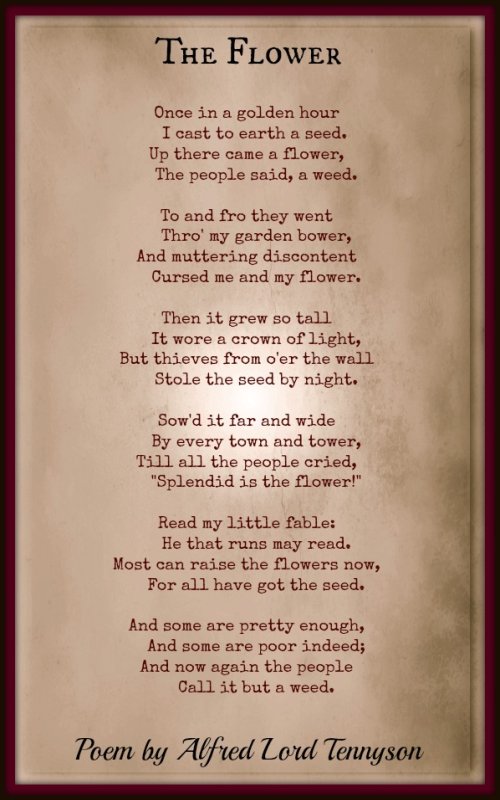
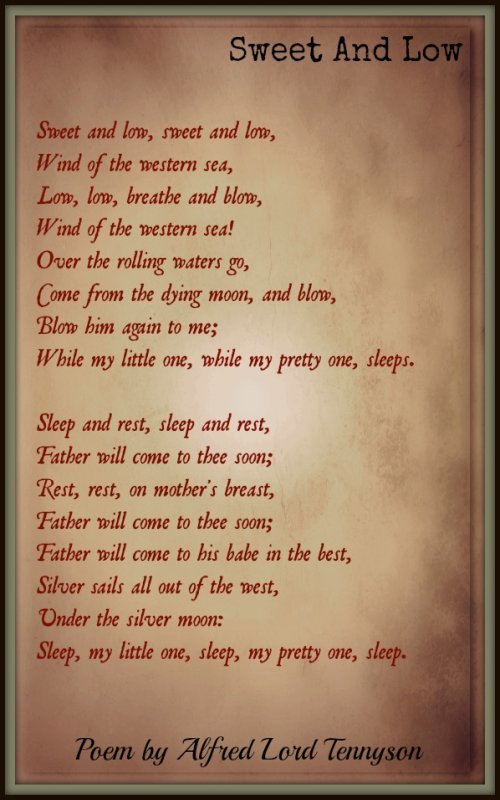
Flower in the Crannied Wall
Flower in the crannied wall,
I pluck you out of the crannies,
I hold you here, root and all, in my hand,
Little flower—but if I could understand
What you are, root and all, all in all,
I should know what God and man is.
The Eagle
He clasps the crag with crooked hands;
Close to the sun in lonely lands,
Ring'd with the azure world, he stands.
The wrinkled sea beneath him crawls;
He watches from his mountain walls,
And like a thunderbolt he falls.
Early Spring
Once more the Heavenly Power
Makes all things new,
And domes the red-plowed hills
With loving blue;
The blackbirds have their wills,
The throstles too.
Opens a door in Heaven;
From skies of glass
A Jacob's ladder falls
On greening grass,
And o'er the mountain-walls
Young angels pass.
Before them fleets the shower,
And burst the buds,
And shine the level lands,
And flash the floods;
The stars are from their hands
Flung through the woods,
The woods with living airs
How softly fanned,
Light airs from where the deep,
All down the sand,
Is breathing in his sleep,
Heard by the land.
O, follow, leaping blood,
The season's lure!
O heart, look down and up,
Serene, secure,
Warm as the crocus cup,
Like snow-drops, pure!
Past, Future glimpse and fade
Through some slight spell,
A gleam from yonder vale,
Some far blue fell;
And sympathies, how frail,
In sound and smell!
Till at thy chuckled note,
Thou twinkling bird,
The fairy fancies range,
And, lightly stirred,
Ring little bells of change
From word to word.
For now the Heavenly Power
Makes all things new,
And thaws the cold, and fills
The flower with dew;
The blackbirds have their wills,
The poets too.
Now Sleeps the Crimson Petal
Now sleeps the crimson petal, now the white;
Nor waves the cypress in the palace walk;
Nor winks the gold fin in the porphyry font;
The firefly wakens, waken thou with me.
Now droops the milk-white peacock like a ghost,
And like a ghost she glimmers on to me.
Now lies the Earth all Danae to the stars,
And all thy heart lies open unto me.
Now slides the silent meteor on, and leaves
A shining furrow, as thy thoughts, in me.
Now folds the lily all her sweetness up,
And slips into the bosom of the lake.
So fold thyself, my dearest, thou, and slip
Into my bosom and be lost in me.
Ulysses
It little profits that an idle king,
By this still hearth, among these barren crags,
Match'd with an aged wife, I mete and dole
Unequal laws unto a savage race,
That hoard, and sleep, and feed, and know not me.
I cannot rest from travel; I will drink
Life to the lees. All times I have enjoy'd
Greatly, have suffer'd greatly, both with those
That loved me, and alone; on shore, and when
Thro' scudding drifts the rainy Hyades
Vext the dim sea. I am become a name;
For always roaming with a hungry heart
Much have I seen and known,— cities of men
And manners, climates, councils, governments,
Myself not least, but honor'd of them all,—
And drunk delight of battle with my peers,
Far on the ringing plains of windy Troy.
I am a part of all that I have met;
Yet all experience is an arch wherethro'
Gleams that untravell'd world whose margin fades
For ever and for ever when I move.
How dull it is to pause, to make an end,
To rust unburnish'd, not to shine in use!
As tho' to breathe were life! Life piled on life
Were all too little, and of one to me
Little remains; but every hour is saved
From that eternal silence, something more,
A bringer of new things; and vile it were
For some three suns to store and hoard myself,
And this gray spirit yearning in desire
To follow knowledge like a sinking star,
Beyond the utmost bound of human thought.
This is my son, mine own Telemachus,
To whom I leave the sceptre and the isle,—
Well-loved of me, discerning to fulfill
This labour, by slow prudence to make mild
A rugged people, and thro' soft degrees
Subdue them to the useful and the good.
Most blameless is he, centred in the sphere
Of common duties, decent not to fail
In offices of tenderness, and pay
Meet adoration to my household gods,
When I am gone. He works his work, I mine.
There lies the port; the vessel puffs her sail;
There gloom the dark, broad seas. My mariners,
Souls that have toil'd, and wrought, and thought with me,—
That ever with a frolic welcome took
The thunder and the sunshine, and opposed
Free hearts, free foreheads,— you and I are old;
Old age hath yet his honor and his toil.
Death closes all; but something ere the end,
Some work of noble note, may yet be done,
Not unbecoming men that strove with Gods.
The lights begin to twinkle from the rocks;
The long day wanes; the slow moon climbs; the deep
Moans round with many voices. Come, my friends.
'T is not too late to seek a newer world.
Push off, and sitting well in order smite
The sounding furrows; for my purpose holds
To sail beyond the sunset, and the baths
Of all the western stars, until I die.
It may be that the gulfs will wash us down;
It may be we shall touch the Happy Isles,
And see the great Achilles, whom we knew.
Tho' much is taken, much abides; and tho'
We are not now that strength which in old days
Moved earth and heaven, that which we are, we are,—
One equal temper of heroic hearts,
Made weak by time and fate, but strong in will
To strive, to seek, to find, and not to yield.
The Brook
I come from haunts of coot and hern,
I make a sudden sally
And sparkle out among the fern,
To bicker down a valley.
By thirty hills I hurry down,
Or slip between the ridges,
By twenty thorpes, a little town,
And half a hundred bridges.
Till last by Philip's farm I flow
To join the brimming river,
For men may come and men may go,
But I go on for ever.
I chatter over stony ways,
In little sharps and trebles,
I bubble into eddying bays,
I babble on the pebbles.
With many a curve my banks I fret
By many a field and fallow,
And many a fairy foreland set
With willow-weed and mallow.
I chatter, chatter, as I flow
To join the brimming river,
For men may come and men may go,
But I go on for ever.
I wind about, and in and out,
With here a blossom sailing,
And here and there a lusty trout,
And here and there a grayling,
And here and there a foamy flake
Upon me, as I travel
With many a silvery waterbreak
Above the golden gravel,
And draw them all along, and flow
To join the brimming river
For men may come and men may go,
But I go on for ever.
I steal by lawns and grassy plots,
I slide by hazel covers;
I move the sweet forget-me-nots
That grow for happy lovers.
I slip, I slide, I gloom, I glance,
Among my skimming swallows;
I make the netted sunbeam dance
Against my sandy shallows.
I murmur under moon and stars
In brambly wildernesses;
I linger by my shingly bars;
I loiter round my cresses;
And out again I curve and flow
To join the brimming river,
For men may come and men may go,
But I go on for ever.
The War
There is a sound of thunder afar,
Storm in the south that darkens the day,
Storm of battle and thunder of war,
Well, if it do not roll our way.
Form! form! Riflemen form!
Ready, be ready to meet the storm!
Riflemen, riflemen, riflemen form!
Be not deaf to the sound that warns!
Be not gull'd by a despot's plea!
Are figs of thistles or grapes of thorns?
How should a despot set men free?
Form! form! Riflemen form!
Ready, be ready to meet the storm!
Riflemen, riflemen, riflemen form!
Let your Reforms for a moment go,
Look to your butts and make good aims.
Better a rotten borough or so,
Than a rotten fleet or a city of flames!
Form! form! Riflemen form!
Ready, be ready to meet the storm!
Riflemen, riflemen, riflemen form!
Form, be ready to do or die!
Form in freedom's name and the Queen's!
True, that we have a faithful ally,
But only the devil knows what he means!
Form! form! Riflemen form!
Ready, be ready to meet the storm!
Riflemen, riflemen, riflemen form!
Maud
Come into the garden, Maud,
For the black bat, Night, has flown,
Come into the garden, Maud,
I am here at the gate alone;
And the woodbine spices are wafted abroad,
And the musk of the roses blown.
For a breeze of morning moves,
And the planet of Love is on high,
Beginning to faint in the light that she loves
On a bed of daffodil sky,
To faint in the light of the sun she loves,
To faint in his light, and to die.
All night have the roses heard
The flute, violin, bassoon;
All night has the casement jessamine stirr'd
To the dancers dancing in tune:
Till a silence fell with the waking bird,
And a hush with the setting moon.
I said to the lily, "There is but one
With whom she has heart to be gay.
When will the dancers leave her alone?
She is weary of dance and play."
Now half to the setting moon are gone,
And half to the rising day;
Low on the sand and loud on the stone
The last wheel echoes away.
I said to the rose, "The brief night goes
In babble and revel and wine.
O young lordlover, what sighs are those
For one that will never be thine?
But mine, but mine," so I sware to the rose,
"For ever and ever, mine."
And the soul of the rose went into my blood,
As the music clash'd in the hall;
And long by the garden lake I stood,
For I heard your rivulet fall
From the lake to the meadow and on to the wood,
Our wood, that is dearer than all;
From the meadow your walks have left so sweet
That whenever a March-wind sighs
He sets the jewelprint of your feet
In violets blue as your eyes,
To the woody hollows in which we meet
And the valleys of Paradise.
The slender acacia would not shake
One long milk-bloom on the tree;
The white lake-blossom fell into the lake,
As the pimpernel dozed on the lea;
But the rose was awake all night for your sake,
Knowing your promise to me;
The lilies and roses were all awake,
They sigh'd for the dawn and thee.
Queen rose of the rosebud garden of girls,
Come hither, the dances are done,
In gloss of satin and glimmer of pearls,
Queen lily and rose in one;
Shine out, little head, sunning over with curls,
To the flowers, and be their sun.
There has fallen a splendid tear
From the passion-flower at the gate.
She is coming, my dove, my dear;
She is coming, my life, my fate;
The red rose cries, "She is near, she is near;"
And the white rose weeps, "She is late;"
The larkspur listens, "I hear, I hear;"
And the lily whispers, "I wait."
She is coming, my own, my sweet;
Were it ever so airy a tread,
My heart would hear her and beat,
Were it earth in an earthy bed;
My dust would hear her and beat,
Had I lain for a century dead;
Would start and tremble under her feet,
And blossom in purple and red.
Blow, Bugle, Blow
THE splendour falls on castle walls
And snowy summits old in story:
The long light shakes across the lakes,
And the wild cataract leaps in glory.
Blow, bugle, blow, set the wild echoes flying,
Blow, bugle; answer, echoes, dying, dying, dying.
O hark, O hear! how thin and clear,
And thinner, clearer, farther going!
O sweet and far from cliff and scar
The horns of Elfland faintly blowing!
Blow, let us hear the purple glens replying:
Blow, bugle; answer, echoes, dying, dying, dying.
O love, they die in yon rich sky,
They faint on hill or field or river:
Our echoes roll from soul to soul,
And grow for ever and for ever.
Blow, bugle, blow, set the wild echoes flying,
And answer, echoes, answer, dying, dying, dying.
Ask Me No More
Ask me no more: the moon may draw the sea;
The cloud may stoop from heaven and take the shape,
With fold to fold, of mountain or of cape;
But O too fond, when have I answer'd thee?
Ask me no more.
Ask me no more: what answer should I give?
I love not hollow cheek or faded eye:
Yet, O my friend, I will not have thee die!
Ask me no more, lest I should bid thee live;
Ask me no more.
Ask me no more: thy fate and mine are seal'd:
I strove against the stream and all in vain:
Let the great river take me to the main:
No more, dear love, for at a touch I yield;
Ask me no more.
A Farewell
Flow down, cold rivulet, to the sea,
Thy tribute wave deliver:
No more by thee my steps shall be,
For ever and for ever.
Flow, softly flow, by lawn and lea,
A rivulet then a river:
Nowhere by thee my steps shall be
For ever and for ever.
But here will sigh thine alder tree
And here thine aspen shiver;
And here by thee will hum the bee,
For ever and for ever.
A thousand suns will stream on thee,
A thousand moons will quiver;
But not by thee my steps shall be,
For ever and for ever.
Come not when I am dead
Come not, when I am dead,
To drop thy foolish tears upon my grave,
To trample round my fallen head,
And vex the unhappy dust thou wouldst not save.
There let the wind sweep and the plover cry;
But thou, go by.
Child, if it were thine error or thy crime
I care no longer, being all unblest:
Wed whom thou wilt, but I am sick of Time,
And I desire to rest.
Pass on, weak heart, and leave to where I lie:
Go by, go by.
The Death of the Old Year
Full knee-deep lies the winter snow,
And the winter winds are wearily sighing:
Toll ye the church bell sad and slow,
And tread softly and speak low,
For the old year lies a-dying.
Old year you must not die;
You came to us so readily,
You lived with us so steadily,
Old year you shall not die.
He lieth still: he doth not move:
He will not see the dawn of day.
He hath no other life above.
He gave me a friend and a true truelove
And the New-year will take 'em away.
Old year you must not go;
So long you have been with us,
Such joy as you have seen with us,
Old year, you shall not go.
He froth'd his bumpers to the brim;
A jollier year we shall not see.
But tho' his eyes are waxing dim,
And tho' his foes speak ill of him,
He was a friend to me.
Old year, you shall not die;
We did so laugh and cry with you,
I've half a mind to die with you,
Old year, if you must die.
He was full of joke and jest,
But all his merry quips are o'er.
To see him die across the waste
His son and heir doth ride post-haste,
But he'll be dead before.
Every one for his own.
The night is starry and cold, my friend,
And the New-year blithe and bold, my friend,
Comes up to take his own.
How hard he breathes! over the snow
I heard just now the crowing cock.
The shadows flicker to and fro:
The cricket chirps: the light burns low:
'Tis nearly twelve o'clock.
Shake hands, before you die.
Old year, we'll dearly rue for you:
What is it we can do for you?
Speak out before you die.
His face is growing sharp and thin.
Alack! our friend is gone,
Close up his eyes: tie up his chin:
Step from the corpse, and let him in
That standeth there alone,
And waiteth at the door.
There's a new foot on the floor, my friend,
And a new face at the door, my friend,
A new face at the door.
Dedication
These to His Memory—since he held them dear,
Perchance as finding there unconsciously
Some image of himself—I dedicate,
I dedicate, I consecrate with tears—
These Idylls.
And indeed He seems to me
Scarce other than my king's ideal knight,
`Who reverenced his conscience as his king;
Whose glory was, redressing human wrong;
Who spake no slander, no, nor listened to it;
Who loved one only and who clave to her—'
Her—over all whose realms to their last isle,
Commingled with the gloom of imminent war,
The shadow of His loss drew like eclipse,
Darkening the world. We have lost him: he is gone:
We know him now: all narrow jealousies
Are silent; and we see him as he moved,
How modest, kindly, all-accomplished, wise,
With what sublime repression of himself,
And in what limits, and how tenderly;
Not swaying to this faction or to that;
Not making his high place the lawless perch
Of winged ambitions, nor a vantage-ground
For pleasure; but through all this tract of years
Wearing the white flower of a blameless life,
Before a thousand peering littlenesses,
In that fierce light which beats upon a throne,
And blackens every blot: for where is he,
Who dares foreshadow for an only son
A lovelier life, a more unstained, than his?
Or how should England dreaming of HIS sons
Hope more for these than some inheritance
Of such a life, a heart, a mind as thine,
Thou noble Father of her Kings to be,
Laborious for her people and her poor—
Voice in the rich dawn of an ampler day—
Far-sighted summoner of War and Waste
To fruitful strifes and rivalries of peace—
Sweet nature gilded by the gracious gleam
Of letters, dear to Science, dear to Art,
Dear to thy land and ours, a Prince indeed,
Beyond all titles, and a household name,
Hereafter, through all times, Albert the Good.
Break not, O woman's-heart, but still endure;
Break not, for thou art Royal, but endure,
Remembering all the beauty of that star
Which shone so close beside Thee that ye made
One light together, but has past and leaves
The Crown a lonely splendour.
May all love,
His love, unseen but felt, o'ershadow Thee,
The love of all Thy sons encompass Thee,
The love of all Thy daughters cherish Thee,
The love of all Thy people comfort Thee,
Till God's love set Thee at his side again!
The Flower
Once in a golden hour
I cast to earth a seed.
Up there came a flower,
The people said, a weed.
To and fro they went
Thro' my garden bower,
And muttering discontent
Cursed me and my flower.
Then it grew so tall
It wore a crown of light,
But thieves from o'er the wall
Stole the seed by night.
Sow'd it far and wide
By every town and tower,
Till all the people cried,
"Splendid is the flower!"
Read my little fable:
He that runs may read.
Most can raise the flowers now,
For all have got the seed.
And some are pretty enough,
And some are poor indeed;
And now again the people
Call it but a weed.
CXV: Spring
Now fades the last long streak of snow,
Now burgeons every maze of quick
About the flowering squares, and thick
By ashen roots the violets blow.
Now rings the woodland loud and long,
The distance takes a lovelier hue,
And drowned in yonder living blue
The lark becomes a sightless song.
Now dance the lights on lawn and lea,
The flocks are whiter down the vale,
And milkier every milky sail,
On winding stream or distant sea;
Where now the seamew pipes, or dives
In yonder greening gleam, and fly
The happy birds, that change their sky
To build and brood, that live their lives
From land to land; and in my breast
Spring wakens too: and my regret
Become an April violet,
And buds and blossoms like the rest.
The Higher Pantheism
The sun, the moon, the stars, the seas, the hills and the plains,-
Are not these, O Soul, the Vision of Him who reigns?
Is not the Vision He, tho' He be not that which He seems?
Dreams are true while they last, and do we not live in dreams?
Earth, these solid stars, this weight of body and limb,
Are they not sign and symbol of thy division from Him?
Dark is the world to thee; thyself art the reason why,
For is He not all but thou, that hast power to feel "I am I"?
Glory about thee, without thee; and thou fulfillest thy doom,
Making Him broken gleams and a stifled splendour and gloom.
Speak to Him, thou, for He hears, and Spirit with Spirit can meet-
Closer is He than breathing, and nearer than hands and feet.
God is law, say the wise; O soul, and let us rejoice,
For if He thunder by law the thunder is yet His voice.
Law is God, say some; no God at all, says the fool,
For all we have power to see is a straight staff bent in a pool;
And the ear of man cannot hear, and the eye of man cannot see;
But if we could see and hear, this Vision-were it not He?
Home They Brought Her Warrior Dead
Home they brought her warrior dead:
She nor swooned, nor uttered cry:
All her maidens, watching, said,
‘She must weep or she will die.’
Then they praised him, soft and low,
Called him worthy to be loved,
Truest friend and noblest foe;
Yet she neither spoke nor moved.
Stole a maiden from her place,
Lightly to the warrior stepped,
Took the face-cloth from the face;
Yet she neither moved nor wept.
Rose a nurse of ninety years,
Set his child upon her knee—
Like summer tempest came her tears—
‘Sweet my child, I live for thee.’
|
|
